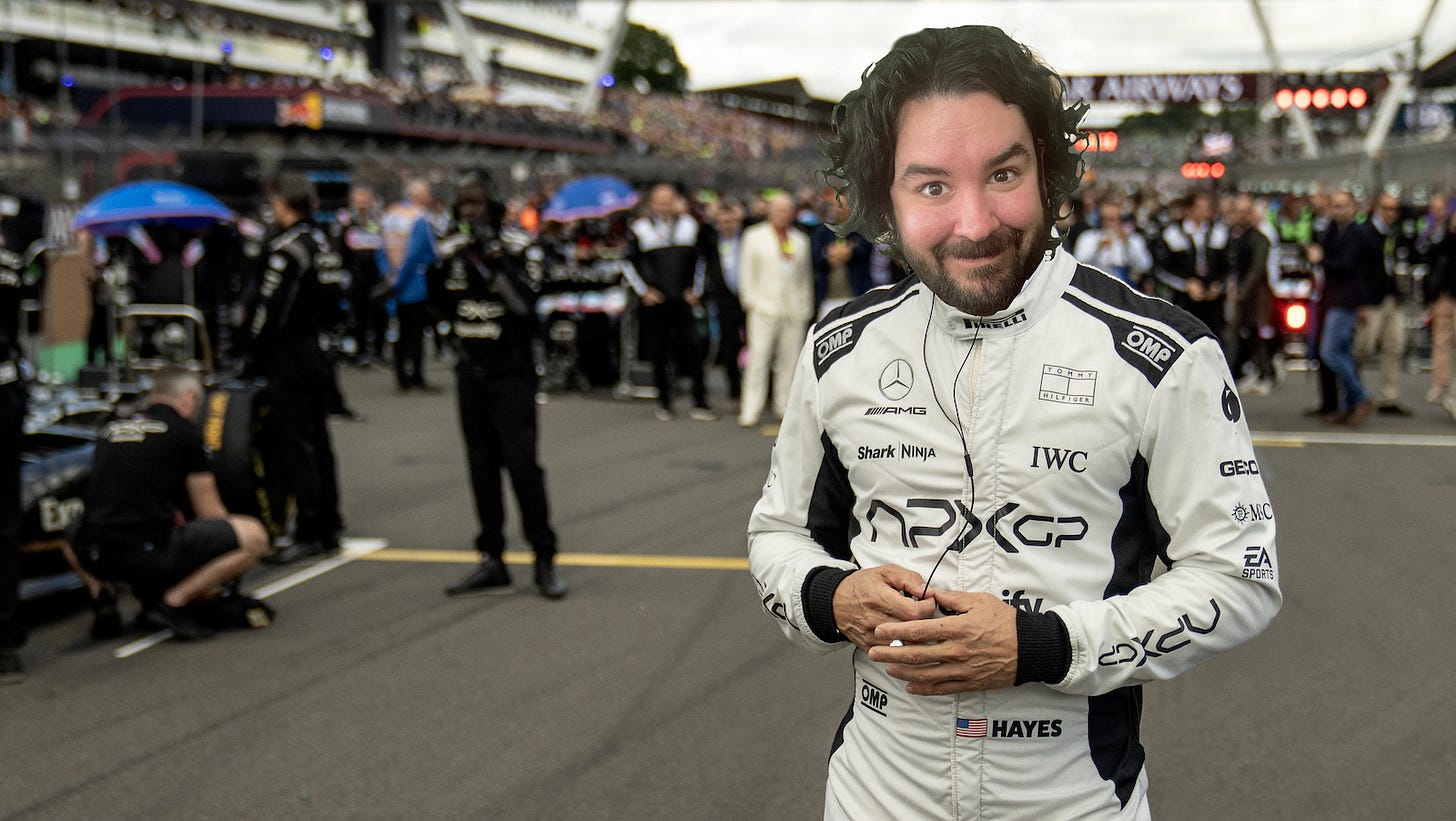
F1 is a movie, but it’s also a long, expensive advertisement for Formula One racing, a sport the American mind has trouble comprehending. So F1 has to operate on two levels — as a piece of cinematic entertainment, and as a promotional tool to persuade consumers in the world’s largest market to be interested in F1 racing. It’s a difficult task; Formula One has been around for 75 years and the American public has never cared about it in any significant way. It’s the Robbie Williams of sports: popular in Europe, rejected in America.
I wanted to go into F1 and come out transformed into a car guy. Alas, it didn’t happen.
I went to see F1 because I wanted to feel it. I wanted to see and hear how Joseph Kosinski, who made me care about fighter jets with Top Gun: Maverick, captured the sensation of speed through sound and editing. If he could make me understand what it feels like to be inside of an F1 car, I would have a deeper appreciation for the skill and style it takes to be a driver. Maybe I would even watch an F1 race on TV someday. But the movie failed to convince me, because even in Dolby Cinema, it didn’t feel fast enough. The roar of the engines was drowned out by the play-by-play announcers’ chatter about Brad Pitt and Damson Idris’ characters even when they’re in like 10th place and wouldn’t be talked about. The camera stayed trained on the cars in a way that didn’t effectively convey that they’re moving at 200 mph. F1 lacks the G-force energy of Top Gun.
The only scene where I felt the speed was at the end, when the camera switches to Brad Pitt’s perspective when he’s “flying” through the course, becoming one with the car and the road as he leaves his competitors in the dust. It was effective because you can see everything around him blowing past him. I suppose Kosinski withheld that camera angle so that it would have maximum when it was finally deployed, but it just made me wish it had been used throughout the film. It would have made the whole experience more fun and exhilarating.
It also didn’t make me mentally understand F1, either. You know how they say, to pick one example, that you don’t need to care about soccer to enjoy and understand Ted Lasso? I wouldn’t say that for F1. To understand everything that’s happening in the movie, it would help to have some working knowledge of the sport. The choice to not over-explain everything for uninformed viewers is probably the correct one for the movie — too much explanation would slow it down and decrease realism — but it did make me feel like I was watching a movie in a foreign language without subtitles. Very often, movies like this have an audience surrogate character who doesn’t know anything that other characters can explain things to, but F1 doesn’t really. Brad Pitt kinda is, because he hasn’t raced Formula 1 in so long that the modern sport is pretty much new to him, but he can drive anything because he’s the best driver in the world (like how Pete “Maverick” Mitchell is the best pilot in the world. They’re very similar movies).
It may not sound like it, but I actually did enjoy the film. It’s very straightforward, old-fashioned entertainment, with great actors playing archetypal characters in a story that hits all the satisfying sports movie beats. Brad Pitt is perfect in a role built entirely around his charm, even if the amount of filler in his face made me sad. It was fun to see Tobias Menzies from Game of Thrones and Outlander in a contemporary role. I have only ever seen him play very formal characters, so it was a delightful surprise every time he showed up as a fake-laid-back sleazebag investor guy. As a story, F1’s ambition is to be crowd–pleasing. It’s aiming for “pretty good,” and it hits that target.
The main thing I came away with is that the sport seems very, very expensive, and that they’d better get it to catch on in America if they want to keep paying for it. I don’t see how they can even afford to do Formula 1. Can you imagine just the cost to ship the cars around the world? Extravagant. Wasteful. And for what? To stroke the egos of the investors who make it possible? Actually, F1 made me hate Formula One.
-One of my favorite shows, Mr. Robot, is now streaming on Netflix. I’ve spent years banging the gong that this show that most people stopped caring about after Season 1 is great the whole way through, and that everyone who likes good TV should watch it. Here I am doing it again for TV Guide, making the case for of-the-moment relevance by connecting the show’s anticapitalist themes to Zohran Mamdani:
The show combines the tense action of an espionage thriller with the paranoid atmosphere of a psychological thriller. It makes the world of computer hacking seem not just exciting, but like the thing that will bring about revolution. Mr. Robot ended in 2019, before the rise of TikTok and ChatGPT; as technology has become even more oppressive in our daily lives since then, watching Elliot and his fellow hackers use the same tech that corporations use to control us against them is even more potent now.
-In case you missed it last week, here’s my review of The Bear Season 4 again, because maybe now that you’ve had time to watch the whole show it will resonate more, and because it’s a good review, if I do say so myself.



BLASPHEMY.